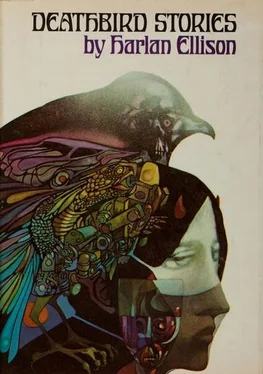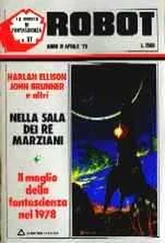He had followed her, down the alley.
And the old, wizened, papyrus-tough Mexican had limped out of his shop, bent almost double with age, like a blue-belly lizard, all alertness and cunning, and had offered to tell them of the future.
“No thanks,” Niven had said, catching up to her at that moment.
But she had tossed her head, defiance, and had entered the shop, leaving him standing in the alley. Niven had followed her, hoping she would turn in an instant, and come out again, and he would find the words. But she had gone deeper into the musky dimness of the shop, and the old prognosticator had begun casting the runes, had begun mixing the herbs and bits of offal and vileness he averred were necessary for truth and brightness in the visions. A bit of wild dog hair. A strip of flesh from the instep of a drowned child. Three drops of menstrual blood from a whore. The circular sucker from the underside of a polyp’s tentacle. Other things. Unspeakable, nameless, foul-smelling, terrible.
And then, strangely, he had said he would not tell the future of Berta…but of Niven.
There in the fetid closeness of a shop whose dimensions were lost in dusk, the old Mexican said Niven was a man without belief, without faith, without trust, and so was damned; a man doomed and forsaken. He said all the dark and tongueless things Niven had never been able to say of himself. And Niven, in fury, in frenzy brought on by a hurricane of truth, smashed the old man, swung across the little round table with all the strength in his big body, clubbed the old man, and in the same movement swept the strange mixed ingredients from the filthy table, as Berta: screamed—from somewhere far away.
And in that instant, a silent explosion. A force and impact that had hurled him out of himself. In that timeless, breathless instant Niven had been there/not-there. He had somehow inexplicably been moved elsewhere. In a bowl, in a valley, in a land, in a time or place or somewhere facing a minotaur. A creature of mythology, a creature from the past of man’s fables.
Huaraches, the sign had said, and Serapes.
Facing a live minotaur just a moment ago. Facing the creature that had left the world before there had been a name to fit the men that Niven had become. A god without worshippers, this minotaur. In a world that did not believe, facing a man who did not believe.
And in that instant—like the previous instant of truth—Niven was all the men who had forsaken their gods. Who had allowed the world to tell them they were alone; and believed it. Now he had to face one of the lost gods. A god who now sought revenge on the race of Men who had devised machines that would banish them from the real world.
Down and down and down into the waters of nowhere Niven plunged, all thoughts simply one thought, all memories crashing and jarring, all merged and melded and impinging upon a dense tapestry of seaweed images.
His breath seemed to clog in his throat. His stomach bulged with the amount of water he had swallowed, with the pressure on his temples, with the blackness that deluged him behind his eyes. Niven felt memory depart and consciousness at once returning—and leaving. He was coming back from the past to awareness, only to let it slip away finally as he drowned.
He made feeble swimming motions, overhand movements of arms that had sensation only by recall, not by his own volition. He moved erratically in the water, as thick as gelatin, and his movement toward the bottomless bottom was arrested. He moved upward through the water now, and saw a dim light, far ahead and above him.
An eternity. There. Toward it he struggled, and when he thought it was ended, he reached a ledge. He pulled himself toward it, and the dark water seeped through him till he was limp and dying. Then his head broke water. He was in an underground cavern. He spewed out mouthfuls of warm, evil-tasting water.
For a very long time he lay half on the ledge, half in the water, till someone came and pulled him up. Niven lay there on his stomach, learning to live again, while the one who had saved him stood silently waiting. Niven tried to get to his feet, and he was helped. He could not see who the man was, though he could feel a long robe in the dimness, and there was a light, a sort of corona that seemed to come dimly from the man. Then together, with the man supporting him, Niven went away from there, and they climbed for a long while between walls of stone, to the world that was outside.
He stood in the light, and was tired and sad and blinded by things he did not believe. Then the man left him, and as he walked slowly away. Niven recognized the beard and the infinitely sad eyes and the way he was dressed, and even the light.
And Jesus left him, with a sad smile, and Niven stood alone, for another time that was long. and empty.
Once, late that night, he thought he heard the bull-ram horn of Odin, ringing across this dim, shadowed land, but he could not be sure. And once he heard a sound of something passing, and when he opened his eyes to look it was a cat-headed woman, and he thought Bast, and she slipped smoothly away into the darkness without saying a word to him. And toward morning there was a light in the sky that seemed to be a burning chariot, Phaëthon the charioteer. Helios’s burning chariot, but that was probably the effects of the drowning, the hunger, the sorrow. He could not be certain.
So he wandered. And time passed without ever moving. In the land without a name; and his name was Niven; but it was no more important a name than Apollo or Vishnu or Baal, for it was not a name men believed in. It was only the name of a man who had not believed. And if gods cannot be called back, when their names have been known, then how can a man whose name was never known be called back?
For him, his god had been Berta, but he had not given her an opportunity to believe in him. He had prevented her from having faith in him, and so there were no believers for a man named Niven, as there were no true believers for Serapis or Perseus or Mummu.
Very late the next night, Niven realized he would always, always live in this terrible Coventry where old gods went to die; gods who would never speak to him; and with no hope of return.
For as he had believed in no god…
No god believed in him.
Kurt Weill and Maxwell Anderson wrote, “Maybe God’s gone away, forgetting His promise He made that day: and we’re lost out here in the stars.” And maybe He/She’s just waiting for the right signal to come back, whaddaya think?
Truly concerned whether or not he would live, the surgeons labored for many hours over Roger Charna. They cryogenically removed the pain areas in his anterior hypothalamic nucleus, and froze parts of him to be worked on later. Finally, it seemed they would be successful, and he would live. They bestowed on him three special gifts to this end: a collapsible metal finger, the little finger of the left hand; a vortex spiral of neon tubing in his chest, it glowed bright red when activated; and a right eye that came equipped with sensors that fed informational load from both the infrared and ultraviolet ends of the spectrum.
He was discharged from the hospital and tried to reestablish the life-pattern he’d known before the accident, but it was useless. Ruth’s family had sent her abroad, and he had the feeling she had been more than anxious to go. She could not have helped seeing the Sunday supplement piece on the operation. His employers at the apartment house had been pleasant, but they made good sense when they said as a doorman he was useless to them. They gave him a month’s termination wages.
He had no difficulty getting another job, happily enough. The proprietors of a bookstore on Times Square felt he was a marvelous publicity item, and they hired him on the spot. He worked the seven o’clock to three A.M. shift, selling paperbacks and souvenirs to tourists and the theater crowd.
Читать дальше












